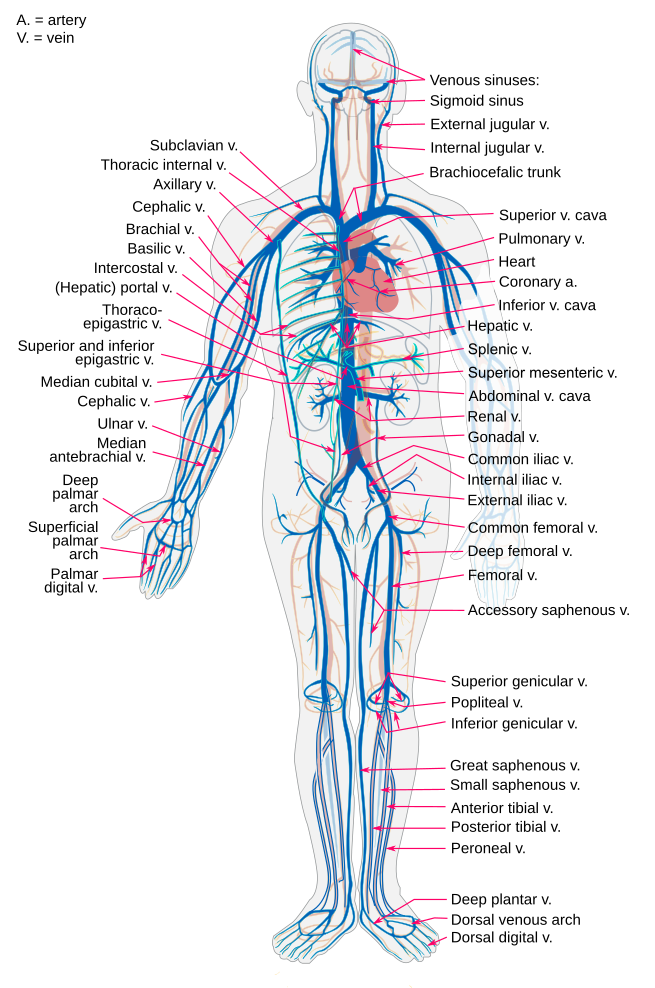Veinnoun
(anatomy) A blood vessel that transports blood from the capillaries back to the heart
Veinnoun
(used in plural veins) The entrails of a shrimp
Veinnoun
(botany) In leaves, a thickened portion of the leaf containing the vascular bundle
Veinnoun
(zoology) The nervure of an insect’s wing
Veinnoun
A stripe or streak of a different colour or composition in materials such as wood, cheese, marble or other rocks
Veinnoun
A topic of discussion; a train of association, thoughts, emotions, etc.
Veinnoun
A style, tendency, or quality.
Veinnoun
A fissure, cleft, or cavity, as in the earth or other substance.
Veinverb
To mark with veins or a vein-like pattern.
Veinnoun
One of the vessels which carry blood, either venous or arterial, to the heart. See Artery, 2.
Veinnoun
One of the similar branches of the framework of a leaf.
Veinnoun
One of the ribs or nervures of the wings of insects. See Venation.
Veinnoun
A narrow mass of rock intersecting other rocks, and filling inclined or vertical fissures not corresponding with the stratification; a lode; a dike; - often limited, in the language of miners, to a mineral vein or lode, that is, to a vein which contains useful minerals or ores.
Veinnoun
A fissure, cleft, or cavity, as in the earth or other substance.
Veinnoun
A streak or wave of different color, appearing in wood, and in marble and other stones; variegation.
Veinnoun
A train of associations, thoughts, emotions, or the like; a current; a course; as, reasoning in the same vein.
Veinnoun
Peculiar temper or temperament; tendency or turn of mind; a particular disposition or cast of genius; humor; strain; quality; also, manner of speech or action; as, a rich vein of humor; a satirical vein.
Veinverb
To form or mark with veins; to fill or cover with veins.
Veinnoun
a blood vessel that carries blood from the capillaries toward the heart; all veins except the pulmonary carry unaerated blood
Veinnoun
a distinctive style or manner;
Veinnoun
any of the vascular bundles or ribs that form the branching framework of conducting and supporting tissues in a leaf or other plant organ
Veinnoun
a layer of ore between layers of rock
Veinnoun
one of the horny ribs that stiffen and support the wing of an insect
Veinverb
make a veinlike pattern
Veinnoun
any of the tubes forming part of the blood circulation system of the body, carrying in most cases oxygen-depleted blood towards the heart.
Veinnoun
(in general use) a blood vessel
Veinnoun
(in plants) a slender rib running through a leaf or bract, typically dividing or branching, and containing a vascular bundle.
Veinnoun
(in insects) a hardened branching rib that forms part of the supporting framework of a wing, consisting of an extension of the tracheal system; a nervure.
Veinnoun
a fracture in rock containing a deposit of minerals or ore and typically having an extensive course underground
Veinnoun
a streak or stripe of a different colour in wood, marble, cheese, etc.
Veinnoun
a source of a specified quality
Veinnoun
a distinctive quality, style, or tendency
Vein
Veins are blood vessels that carry blood towards the heart. Most veins carry deoxygenated blood from the tissues back to the heart; exceptions are the pulmonary and umbilical veins, both of which carry oxygenated blood to the heart.
Arterynoun
An efferent blood vessel from the heart, conveying blood away from the heart regardless of oxygenation status; see pulmonary artery.
Arterynoun
A major transit corridor.
Arterynoun
The trachea or windpipe.
Arterynoun
One of the vessels or tubes which carry either venous or arterial blood from the heart. They have tricker and more muscular walls than veins, and are connected with them by capillaries.
Arterynoun
Hence: Any continuous or ramified channel of communication; as, arteries of trade or commerce.
Arterynoun
a blood vessel that carries blood from the heart to the body
Arterynoun
a major thoroughfare that bears important traffic
Arterynoun
any of the muscular-walled tubes forming part of the circulation system by which blood (mainly that which has been oxygenated) is conveyed from the heart to all parts of the body.
Arterynoun
an important route in a system of roads, rivers, or railway lines
Artery
An artery (plural arteries) (from Greek ἀρτηρία (artēríā) 'windpipe, artery') is a blood vessel that takes blood away from the heart to one or more parts of the body (tissues, lungs, brain etc.). Most arteries carry oxygenated blood; the two exceptions are the pulmonary and the umbilical arteries, which carry deoxygenated blood to the organs that oxygenate it (lungs and placenta, respectively).





